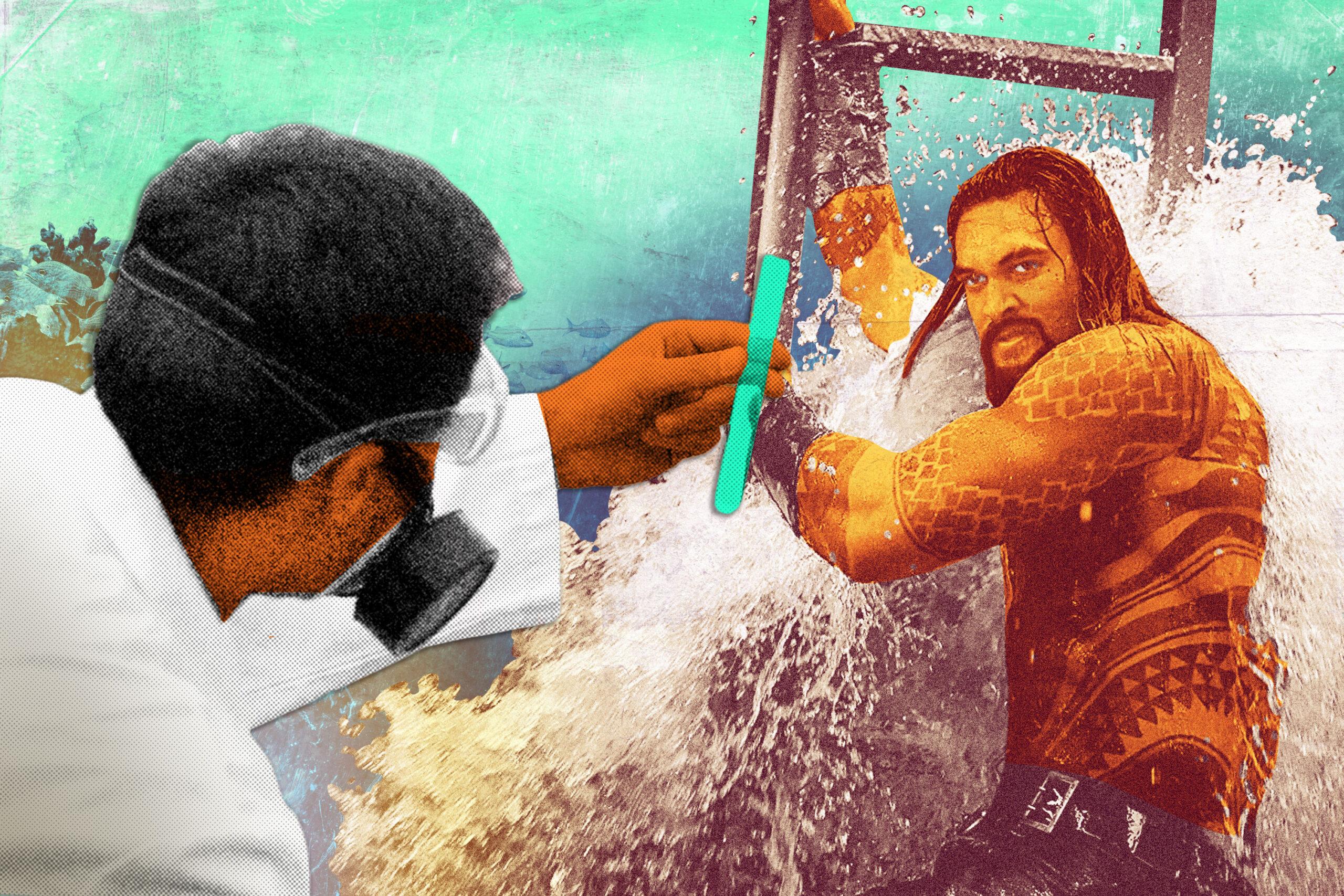

Aquaman is a (I’m sorry) massive sea change for the perpetually unpredictable DC Extended Universe. Like Wonder Woman before it, the film eschews any references to other DCEU projects, superheroes, and the larger cinematic enterprise that Warner Bros. is aiming to build—instead focusing on unique world-building and a compelling narrative that can stand on its own. It’s really delightful. It is also quite batshit.
Turns out the memeable posters, the campy trailers, and the fact that the soundtrack includes a Pitbull cover of Toto’s “Africa” were indicators of a larger trend. This isn’t a slight: Director James Wan treats Aquaman less like a superhero origin story and more like the launching pad for an ocean-themed fantasy blockbuster. The ancient city of Atlantis resembles a submerged Tron; the climactic battle, with laser cannons and lurid underwater battalions, looks like something out of the Star Wars prequels. But more than anything, Aquaman is an ostensibly radical interpretation of the planet’s oceans, what kind of creatures inhabit it, and [deep breath] whether the deepest trench of the sea leads straight into the Earth’s core, where there’s a hidden land removed from the constructs of time, filled with dinosaurs and an ancient leviathan with the voice of Julie Andrews. (Yes, really!)
It all appears to be really entertaining hogwash, but there was only one way to be certain that the ocean isn’t secretly filled with mythological creatures and sea portals to dinosaur island. To help me break down the wildest aspects of the ocean according to Aquaman, I called Dr. Stephen Kajiura, a professor at Florida Atlantic University’s department of biological sciences, to discuss all things fish-men, Atlantis, and the many bizarre wonders of the Aquaverse. Light spoilers for Aquaman ahead.
In the world of Aquaman, the lost city of Atlantis is real—and not only that, it’s still thriving as an underwater metropolis with lots of futuristic technology. Is there a consensus on Atlantis? Was it ever a real place?
Oh, yikes. My understanding of Atlantis was it was somewhere in the Mediterranean. Wasn’t it? I think it was Crete or something? Wasn’t it based on a description by—oh, good heavens, was it Plato?
It was Plato, yeah.
Yeah, when he described an island, like a port and everything. And historians seem to think that it was what we would call Crete now, but that’s about the extent of what I know about the actual Atlantis.
I ask only because, in Aquaman, there is a minor character in the film (played by Randall Park) who is a marine biologist—and he’s laughed off by his peers, because he’s convinced Atlantis is real. In his defense, Aquaman exists in this world, and people don’t seem to bat an eye. But what would be the kind of response if someone in your field were peddling an “Atlantis might actually be real” theory?
The same sort of thing. There’s no evidence that it could ever have existed, in the legendary aspect. So yeah, we would laugh him off as well, as kind of a nut.
What would be the weirdest thing that someone in your field could realistically try to peddle that wouldn’t be totally laughed off?
Well, there is one aspect [of Aquaman] that is partially based on fact. If you look at the evolutionary history of humans, we are the only naked apes anywhere. All of our relatives, 193 species, are covered in hair, and one is hairless, and those are humans, right? And so one of the questions has always been, “Why are humans the only naked apes?”
One of the ideas behind that is that we actually went through an aquatic phase at some point, where we were wetter than most of our primate relatives. We were in some sort of wet habitat. And if you’re wet, you don’t want to be covered in hair; it doesn’t help you in that sort of environment. Some people have taken this to say, “Well, maybe we lived in the water for a while.” No, that’s not true.
What actually happened is we were in seasonally flooded forests, where you had a lot of water coming up, and you had to wade from tree to tree, and that might have been one of the reasons for losing hair. But people have taken this to say, “Well, we’re the only naked apes. We’re the only ones who have these weird adaptations for an aquatic existence. Maybe that points to this sort of Atlantis.” So that, that’s not completely wrong—you couldn’t completely laugh them off—but as they try to extrapolate it too much, you would say, “No, no, you’re just going too far.”
In Aquaman, after the fall of Atlantis many centuries ago, the surviving Atlanteans split off to different corners of the ocean and, over time, end up developing very different physiologies. The people who still reside in the Kingdom of Atlantis look very similar to humans, but others are quite different. One subset of Atlanteans turned into mermaid-like creatures, others became human-sized crustaceans, and the ones who were living in the deepest part of the ocean became very aggressive and rabid and averse to light. To what extent would species living in the ocean adapt to their surroundings like that?
That’s actually not that far off. So things that live in the deep ocean, you would expect them to have enormous eyes, for example—if they were to take advantage of any tiny bit of light which came down there. And down there, it’s a lot colder too, right? So metabolic rate scales with temperature. So the colder it is, the slower you’re going to move. So you might expect them to be more sluggish, slow-moving things. You might expect them to maybe have some bioluminescence, if they feel the need to create their own light for communication, or for finding mates. Those sorts of things are probably right for deep sea organisms.
I should add, the former Atlanteans that live in the deepest part of the ocean move very fast and have razor-sharp teeth and jumped onto a boat.
Huh. Well, cool. That’s the opposite of what I would predict, but OK, good.
In terms of other things, like sprouting fins instead of legs, you need the initial mutation upon which natural selection could subsequently act. So you’d need some initial mutation that causes some individuals to be born with fin feet, whatever you wanna call them. One of the limitations here is, you’re talking about a very short period of time from the time Atlantis fell until now. It’s not nearly enough evolutionary time for these adaptations to appear.
The other big thing with Atlanteans is that they were once normal humans living above the sea and now they can survive underwater. What kind of physiological changes would be necessary for humans to survive in the ocean?
Pray. [Laughs.] Well, there’s a couple of things. Number one, breathing is the big thing. Our lungs are made for extracting oxygen from air, and water is just not gonna work for that. So that would be one thing that would be the biggest problem. Secondly, you’re not gonna see anything. Our corneas, the eyes, are not made for focusing underwater. The index of refraction of the water is similar to the index of refraction of the cornea itself, so you don’t get much focusing power from the cornea. As a result, everything would be blurry. That’s not gonna work very well. So you’d need an extra—I don’t know what you’d need. You’d need an extra eyelid, so to speak, like a clear one in front. That would help.
There’s all these other physiological factors that would contribute to us being really awkward moving underwater. Not being particularly graceful compared to the other organisms. We’re gangly beasts underwater. We’re made for the trees, basically.
Aquaman the character is the only Atlantean who has the ability to talk to fish and other sea creatures. However, there are many animals that are still subservient to Atlanteans. Some of them ride sharks into battle like they’re horses.
Oh, wow.
Would humans would be able to train animals underwater? And would there be some species that would be more effective to train, to obey us, than others?
We’ve been very successful at training marine mammals to do all sorts of things. You see dolphins jumping backwards through hoops or whatever else. Sea lions balancing balls on their nose. Entertaining us, basically. In terms of training, there are certain species that are gonna do really well with that. Sharks are not necessarily these mindless little eating machines. There was work done in the 1950s where [scientists] actually trained sharks: They would swim up, push a button, go get a food reward, that sort of thing. So that would be the same sort of training paradigm you would use with any other animal, and the sharks were able to learn the same sorts of tricks.
I think we might be short-selling a lot of the other organisms out there. Sharks can be trained; octopuses, who are very smart and able to do problem-solving. I think there’s some actual real potential, based in reality, that some of these organisms can in fact be trained and conditioned in a lab.
I should note, it’s not just mammals like sharks and dolphins in Aquaman. There are prehistoric creatures, and even a leviathan voiced by Julie Andrews. It’s probably fair to say these aren’t real creatures we’d find in the ocean.
Yeah.
What would be the strangest actual animals living in the sea that normal people might not realize or know about that much?
Some of the things that a lot of people are unfamiliar with are a lot of the deep water organisms. So you have these deep water isopods, these crustaceans that are—they’re huge. Well, relatively huge. They’re not the sort of things you ride around on, except in Aquaman. But there are real organisms that are that big that are wandering around, especially in the deep sea.
There’s things like giant squids, who are enormous and really cool. And some of these big, giant octopuses, these might have been the bases for some of these mythological creatures, like the Kraken, for example. There are real things that form this sort of foundation for mythology. And I think it’s interesting to explore where humans, with their imaginations, have gone from these actual live animals.
It’s revealed in Aquaman that inside the Earth’s core, there’s a secret hidden ocean, with a small island that’s sort of unstuck in time. It’s where there’s this secret Atlantean trident. And for example, dinosaurs exist there. It’s accessible through a deep sea trench.
… Right.
Do we know enough about underwater trenches to know that there’s nothing, say, prehistoric there? Let alone something like a portal to a dinosaur island?
Did you see the movie The Meg this summer?
I did! I was going to ask about that, because the entire premise is based on the fact that megalodons are secretly living among us, swimming below the trench.
It sounds like the same sort of thing. People are fascinated by these deep-water trenches. I hate to be the bearer of bad news, but really, there’s nothing down there but mud. I fear that we know enough about the topography that there’s nothing beyond these deep trenches. Certainly no secret passages. And I’m quite certain that there’s no internal sub-ocean with islands and tridents. Or dinosaurs, for that matter.
The main villain of Aquaman wants to wage war against surface-dwelling humans, in part because of how much we’ve polluted the oceans. He’s taking the extreme approach to an otherwise legitimate point. What small part can everyday people do to protect our oceans?
There’s a big move now, and I think it’s a good one, to try to minimize the amount of plastic that gets disposed. So people are doing away with plastic straws, for example, in fast food restaurants and things like that. And I think that goes a long way. Because a lot of these products are out there, and they’re having a real, genuine detrimental impact on the environment and animals. Minimizing the amount of disposable waste that they’re generating, and minimizing the amount of stuff that’s getting thrown into landfills, and eventually being, in some cases, lost in the environment, in the oceans. That’s something that people genuinely could do.
This interview has been edited and condensed for clarity.

